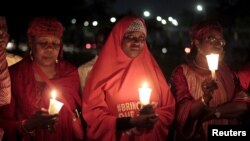Protesters held a march and vigil in Nigeria's capital on Thursday, the 500th day since more than 200 schoolgirls were kidnapped in Chibok by Boko Haram militants.
Former President Goodluck Jonathan was criticized at home and abroad for his inability to end the Boko Haram insurgency. But three months into the term of his successor, Muhammadu Buhari, the militant group has stepped up attacks and the girls are still missing. Many critics are saying that while the new government is still settling in, there doesn't seem to be a sense of urgency about rescuing the girls.
"Several people have been killed as a result of this insurgency in Nigeria. We are lighting this candle today in honor of every one of them," said Bukky Shonibare, a member of the Bring Back Our Girls social media and protest campaign. " ... We will keep the fire burning until [the schoolgirls] are brought back alive."
Edith Yaseer, another member dressed in the campaign's signature red T-shirt and holding a candle at the Abuja vigil, said, "This light here signifies that we are still hopeful and we are going to continue to stand. We are hoping that we won’t have to stand for much longer, because we really want our girls to come back now, and alive."
Omolola Adele-Oso of Act for Accountability told VOA that the “Enough is Enough” group that has been leading the charge on the issue in Lagos marched to the governor’s office to voice that little or no action had been taken since the girls were abducted.
Adele-Oso praised Buhari’s recent decision to replace the heads of the army, navy and air force, saying that it was a step in the right direction in the fight against Boko Haram. However, she and others are waiting for a rescue mission.
“Is this going to be a larger part in the campaign against Boko Haram? When are we actually going to put something tangible on the table to say this is what the action plan is to get them back to their families and their community?” she asked.
The militant group kidnapped some 270 girls and women from a school in Chibok in April 2014. About 50 escaped, but the rest remain in captivity.
Speaking at an event in Abuja alongside the country's vice president, U.N. Secretary-General Ban Ki-moon, who visited Nigeria this week, said, “The United Nations needs to have a strong partnership with Nigeria in peace, security, development and human rights.” He also called for the unconditional release of the remaining abducted schoolgirls.








